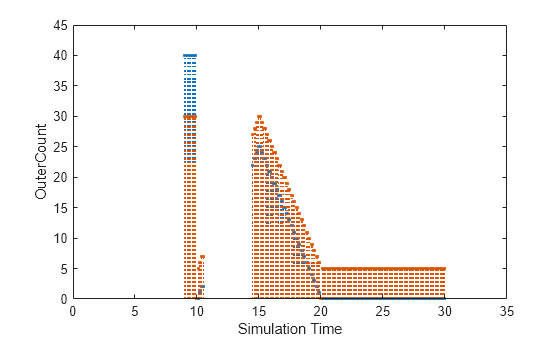Save Run-Time Data from Simulation
Save simulation data such as output, signal, time, state, and data store
logging data
You can save simulation data to the MATLAB® workspace or to a file, including an MLDATX file, MAT file, or Excel® file, during simulation for later retrieval and postprocessing. Simulation data can include any combination of output, signal, time, state, and data store logging data.
Saving simulation data in Dataset format simplifies
postprocessing by providing a common format for the results of a variety of
logging techniques. Using Dataset format stores the data
as MATLAB
timeseries or timetable objects, which you
can process with MATLAB.
To determine which approach to use for logging data, see Save Simulation Data.
Blocks
| Outport | Create output port for subsystem or external output |
| Record | View and log data to the workspace, a file, or both (Since R2021a) |
| To File | Write data to file |
| To Workspace | Log data to workspace from Simulink model |
Tools
| Instrumentation Properties | View and edit logging and visualization properties for logged signal |
| Signal Properties | View and edit signal properties |
| Simulation Data Inspector | Inspect and compare data and simulation results to validate and iterate model designs |
| Simulink Signal Logging Selector | View signal logging configuration and override signal logging settings |
Functions
Objects
Model Settings
Topics
Simulation Data
- Save Simulation Data
Save simulation data for analyzing and debugging a model. - View and Access Logged Simulation Data
View and access saved simulation data for a completed or paused simulation. - Data Format for Logged Simulation Data
You can use many formats for logged data, includingDataset, MATLABtimeseries, arrays, and structures. Supported data formats vary between different logging techniques. However,Datasetformat is available for all logging techniques. - Log Data to the Workspace and a File Using the Record Block
Use the Record block to log data to the workspace, to a file, or to both the workspace and a file. - Convert Data to Dataset Format
To convert a workspace variable that contains data that was logged in a format other thanDatasetformat to useDatasetformat, use aSimulink.SimulationData.Datasetconstructor. - Samples to Export for Variable-Step Solvers
Control how much output the simulation generates when your model uses a variable-step solver. Use the Output options configuration parameter.
Signal Logging
- Save Signal Data Using Signal Logging
Capture signal data from a simulation by marking signals you want to log in the model. - Override Signal Logging Settings
For a specific simulation run, override the signal logging settings for individual signals marked for logging. - View the Signal Logging Configuration
View the signals that are marked for signal logging. - Visualize and Access Signal Logging Data
View and access the signal logging data for a completed or paused simulation. - Access Logged Signals with Spaces and Newlines in Logged Names
Access logged signals with names that contain spaces or newlines.
Big Data
- Work with Big Data for Simulations
Log, load, and analyze big data for simulations. - Limit the Size of Logged Data
Choose among several strategies to limit the size of logged data. - Specify Signal Values to Log
Specify which signal values to log during simulation. - Log Data to Persistent Storage
Store logged simulation data to persistent storage in a MAT file. - Export Data to Parquet File Using Record Block
Use the Record block to export data to a Parquet file. - Analyze Big Data from a Simulation
Access simulation data logged to persistent storage for analysis in MATLAB.
Simulation State
- Save Block States and Simulation Operating Points
Learn how you can use state information logged from simulation and decide how to log states and operating points. - Save State Information
Save state information for logged states.
Data Stores
- Log Data Stores
Configure a data store for logging so that you can view the data stored in a simulation run.
